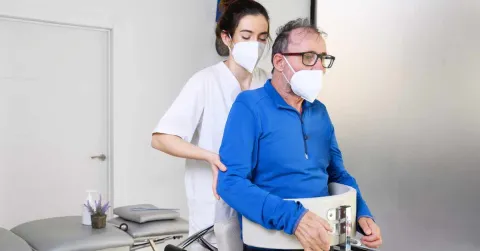Multiple Sclerosis
Overview
RPM 236 - Multiple sclerosis is a chronic, disabling disease characterized by four disease course progressions. Be able to monitor a patient in different forms of the disease by using remote patient monitoring devices.
By the end of the badge course, trainees will be able to do the following:
- Define Multiple Sclerosis (MS)
- Explain briefly the pathophysiology of MS
- List the symptoms of Multiple Sclerosis
- List the common drugs for MS and side effects
- Assist with medication management
- Provide education to patient and family members
- Coordinate appointments and tests
- Use RPM to help monitor the patient
- Explain typical DMP settings for each progression of the disease
Time Estimate:
3 hours
Course Content
LESSONS
1. Define Multiple Sclerosis
Lesson Content
Relapsing-remitting MS
default
Pop Quiz: Relapsing-remitting MS
pop_quiz
Secondary progressive MS
default
Pop Quiz: Secondary progressive MS
pop_quiz
Primary progressive MS
default
Pop Quiz: Primary progressive MS
pop_quiz
Progressive relapsing MS
default
Pop Quiz: Progressive relapsing MS
pop_quiz
Pathophysiology of MS
default
Pop Quiz: Pathophysiology of MS
pop_quiz
2. List the symptoms of Multiple Sclerosis
Lesson Content
Relapsing-remitting MS (RRMS)
default
Pop Quiz: RRMS
pop_quiz
Secondary progressive MS (SPMS)
default
Pop Quiz: SPMS
pop_quiz
3. List the common drugs for MS and side effects
Lesson Content
Interferon beta
default
Pop Quiz: Interferon beta
pop_quiz
Glatiramer acetate
default
Pop Quiz: Glatiramer acetate
pop_quiz
Dimethyl fumarate
default
Pop Quiz: Dimethyl fumarate
pop_quiz
Fingolimod
default
Pop Quiz: Fingolimod
pop_quiz
Teriflunomide
default
Pop Quiz: Teriflunomide
pop_quiz
Natalizumab
default
Pop Quiz: Natalizumab
pop_quiz
Alemtuzumab
default
Pop Quiz: Alemtuzumab
pop_quiz
Ocrelizumab
default
Pop Quiz: Ocrelizumab
pop_quiz
4. Assist with Medication Management
Lesson Content
Educate patient about correct dosage, timing and side effects
default
Pop Quiz: Educate patient about correct dosage, timing and side effects
pop_quiz
Monitor for medication adherence by conducting medication reconciliation
default
Pop Quiz: Monitor for medication adherence by conducting medication reconciliation
pop_quiz
Refill prescriptions at pharmacies
default
Pop Quiz: Refill prescriptions at pharmacies
pop_quiz
Facilitate communication between patients and healthcare providers regarding their medications and side effects if any
default
Pop Quiz: Facilitate communication between patients and healthcare providers regarding their medications and side effects if any
pop_quiz
Document up-to-date medication lists, dosage, schedules and share info with the health team
default
Pop Quiz: Document up-to-date medication lists, dosage, schedules and share info with the health team
pop_quiz
5. Provide education to patient and family members
Lesson Content
Explain briefly the pathophysiology of the disease
default
Pop Quiz: Explain briefly the pathophysiology of the disease
Explain the clinical course of different types of MS
pop_quiz
Pop Quiz: Explain the clinical course of different types of MS
Discuss common symptoms
default
Pop Quiz: Discuss common symptoms
Discuss the quality of life and daily activities effects
pop_quiz
Pop Quiz: Discuss the quality of life and daily activities effects
Explain various medications and other available treatments
default
Pop Quiz: Explain various medications and other available treatments
pop_quiz
6. Coordinate appointments and tests for the patient
Lesson Content
MRI
default
Pop Quiz: MRI
pop_quiz
Blood tests
default
Pop Quiz: Blood tests
pop_quiz
Visual evoked potentials
default
Pop Quiz: Visual evoked potentials
pop_quiz
Lumbar puncture
default
Pop Quiz: Lumbar puncture
pop_quiz
Braces and splints
default
Pop Quiz: Braces and splints
pop_quiz
7. Use RPM to monitor patient
Lesson Content
Blood pressure
default
Pop Quiz: Blood pressure
pop_quiz
Heart rate
default
Pop Quiz: Heart rate
pop_quiz
Temperature
default
Pop Quiz: Temperature
pop_quiz
Respiratory rate
default
Pop Quiz: Respiratory rate
pop_quiz
Weight
default
Pop Quiz: Weight
pop_quiz
Explain DMP setting for each progression of the disease
default
Pop Quiz: Explain DMP settings for each progression of the disease
pop_quiz
SUMMARY
ASSESSMENT
Image
